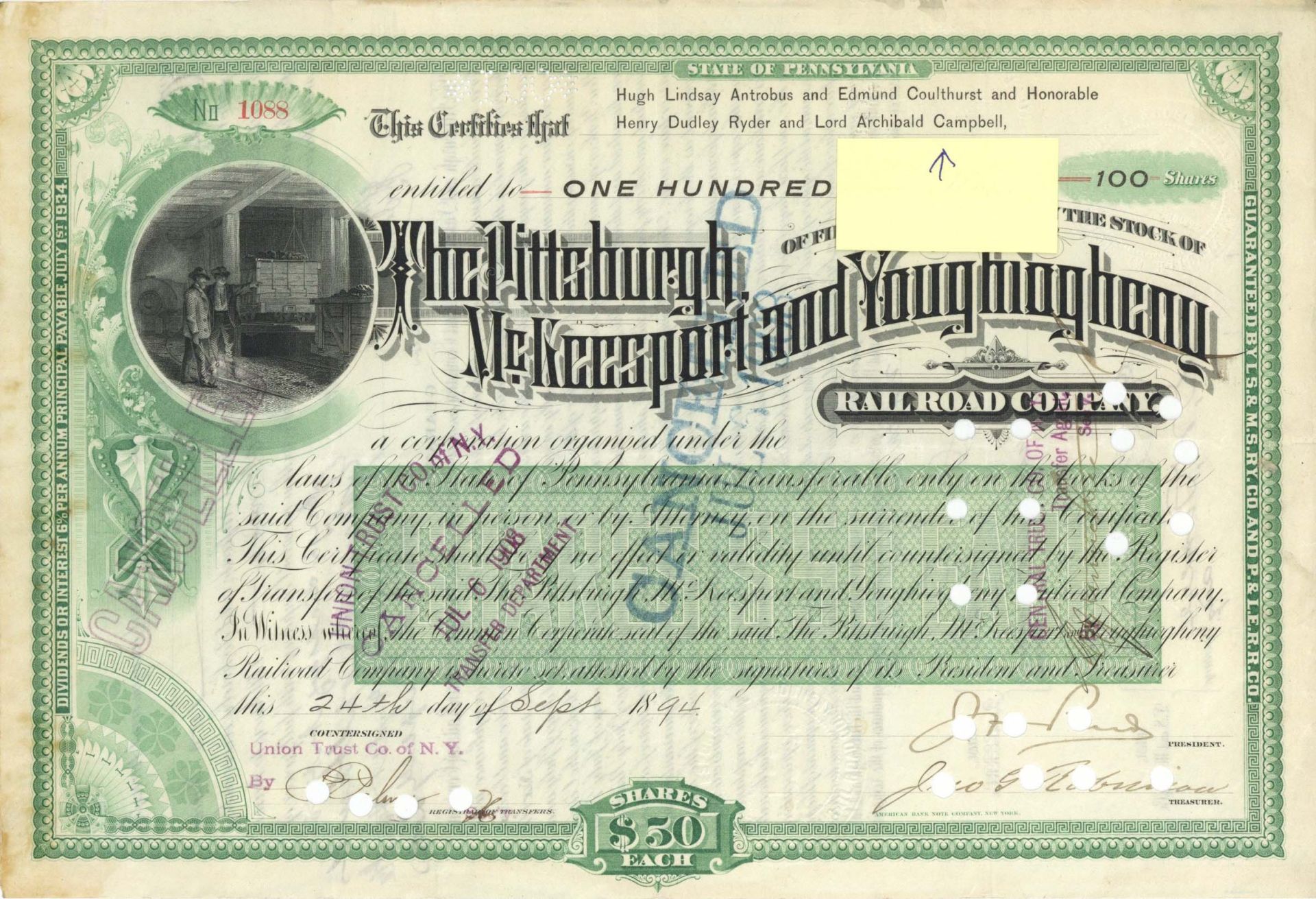Pittsburgh, McKeesport and Youghiogheny Railroad Co. Issued to Hugh Lindsey etc. - Autographed Stocks and Bonds
Inv# AG2492 Stock
Stock issued to Hugh Lindsay Antrobus and Edmund Coulhurst and Honorable Henry Dudley Ryder and Lord Archibald Campbell.

Hugh Lindsay Antrobus Date of birth: January 1, 1823 (age 199 years) Partner: Mary Adam (1859–) Children: Marion Lindsay Antrobus, Katherine Mary Antrobus, Charles Antrobus, Elizabeth Antrobus, Helen Antrobus Parents: Anne Lindsay, Sir Edmund Antrobus, 2nd Baronet Grandchildren: John Leigh, Stella Katherine Drummond, MORE Grandparents: John Antrobus, Anne Crawfurd, Hugh Primrose Lindsay, Jane Gordon
Henry Ignatius Dudley Ryder (3 January 1837 – 7 October 1907, Edgbaston, Birmingham) was an English Roman Catholic priest of the Birmingham Oratory and controversialist. Ryder's lifelong connection with John Henry Newman and the Oratory began as a private pupil, when he was about twelve years old. The only interruption was a year at the English College at Rome and a few months at the Catholic University of Ireland in Dublin, of which Newman was rector, before he began in December, 1856, his Oratorian novitiate. In 1863 he was ordained priest. After Cardinal Newman's death he was elected superior of the Birmingham Oratory and held this office till his health gave way. He was the last survivor of "my dearest brothers of this House, the Priests of the Birmingham Oratory" to whom Newman dedicated his Apologia Pro Vita Sua. His grave is with theirs and Cardinal Newman's at Rednal, a small country house belonging to the Birmingham Oratory, about seven miles from Birmingham. His life was uneventful. He cared little for notoriety or even fame. Once only did he push himself forward. This was in 1867-8, when he attacked W. G. Ward, at that time editor of Dublin Review. His opinions on papal infallibility, according to Ryder, were a caricature, and he delivered his protest in three pamphlets. He was criticized for them.
Lieutenant-Colonel Archibald Campbell Campbell, 1st Baron Blythswood, FRS (22 February 1835 – 8 July 1908) was a Scottish soldier, Tory politician, scientist and Grand Master of the Grand Lodge of Scotland. Born Archibald Campbell Douglas (he dropped the Douglas from his name in 1838) in Florence, Tuscany, he was the son of Archibald Campbell, 17th Laird of Mains, until 1838 known as Archibald Douglas. Campbell joined the 79th Highlanders at the age of 16 and fought in the Crimean War in 1855, where he was severely wounded. He transferred to the Scots Fusilier Guards and rose to the rank of Lieutenant-Colonel. On 7 July 1864, he married Hon. Augusta Clementina Carrington, a daughter of Robert Carrington, 2nd Baron Carrington, at Whitehall Chapel, London. He retired from the army in 1868 on the death of his father. He was Member of Parliament (MP) for Renfrewshire from 1873 to 1874, and for West Renfrewshire from 1885 to 1892. He was also Lord Lieutenant of Renfrewshire from 1904 to 1908. On 4 May 1880, he was created a baronet, of Blythswood and was an Aide-de-camp to Queen Victoria. In 1888 he was awarded an honorary doctorate of Law from the University of Glasgow and made a Freeman of the City of Glasgow. He was conferred with Honorary Membership of the Institution of Engineers and Shipbuilders in Scotland in 1891. On 24 August 1892, he was created Baron Blythswood, with a special remainder to his five younger brothers. He was a notable scientist and took his wife to Thebes to observe the Transit of Venus in 1874, taking with him a small transit instrument, a 6-inch telescope and a 12-inch telescope, recording the time of first contact, and also observed a white halo, proving an atmosphere around Venus. From 1892 to 1905 the Blythswood Laboratory at his family seat was used to experiment into many areas at the borders of physics, including the use of cathode rays, X-rays, spectroscopy and radioactivity. He designed a speed indicator, which was fitted to ships of the Royal Navy, and carried out studies into the efficiency of aerial propellers some years before the Wright Brothers' first powered flight in 1903. He was elected a Fellow of the Royal Society in May, 1907 and died possessed of the family seat in Renfrewshire and Halliford Manor in Shepperton. He was for many years linked to the 3rd (The Blythswood) Volunteer Battalion of the Highland Light Infantry, where he was commanding Colonel, and from 28 May 1902 appointed Honorary Colonel. He died at age 73 at his home Blythswood House, Renfrewshire, without issue and was buried on 11 July 1908 at Inchinnan. His baronetcy became extinct but his barony passed to his brother, Rev. Sholto Campbell, succeeded by younger brothers still, Barrington and Archibald.
A stock certificate is issued by businesses, usually companies. A stock is part of the permanent finance of a business. Normally, they are never repaid, and the investor can recover his/her money only by selling to another investor. Most stocks, or also called shares, earn dividends, at the business's discretion, depending on how well it has traded. A stockholder or shareholder is a part-owner of the business that issued the stock certificates.









Ebay ID: labarre_galleries